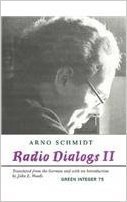What do you think?
Rate this book


382 pages, Paperback
First published May 1, 2003
He who would speak of unknown authors, buried beneath the rubble of centuries, inevitably lays himself open, at least to begin with, to the suspicion of being a crotchety sort with very queer tastes.From volume the Second ::
When an important writer recommends a work to you -- whether by openly naming the title; or by shy=covert use of it (which perhaps is the greater praise) then go right ahead and follow his momentous hint ! A man with expertise and taste has done trusty spade-work for you : {pre=reading} and winnowing 1000 volumes of antiquated chaff for you. Not to make grateful use of such a hint would mean my thoughtless=arrogant shoving aside all the precious, irreplaceable hours that a venerable predecessor spent reading for me.Schmidt’s Spade=Wielding credentials are well=attested.
B.: And so, if asked my opinion of the general phenomenon {Herder}, I would reply : His life ? : the most compelling cautionary image in our mirror; seen only once before, in the much more glaringly=significant Swift; a {Prime-Number man}, 2 raised to the 2281st power minus 1; divisible only by one=and=himself : cave !
A.: His work ? : the tragedy and triumph of polymathy : a great master of a vast series of micro=, nano=, and pico=works of art. An inspiration to the specialist, whipping one’s sense of language to a pitch with savage coined words. Thoughts less informative than provocative; his technique, that of the “infinite aphorism” -- Nietzsche achieved only the level of “finite” :
Herder is inexhaustible {chernozem}, fathom-deep {Black Earth}, concealing within it centuries of fat harvests -- a metaphor of which he himself would probably have approved.
B. (concluding mysteriously): Herder ? : A giant in the sky; the planet-sized plains of his continents sewn thick with herbs, sociably waving demigrasses, contoured lawns of heath, beneath a searing sun, or saturated thunder-clouds : spice is haunting above all gray non=groves.
A.: Where, as on the manifest sea, the horizon is enclosed by a pure circular line; limiting the eye, yet at the same time strangely stirring the soul with the force of the unbounded : a prairie=spectacle unlike any in the literature of all the nations !
...where is old {Anton Reiser}, which is far more deserving of such a badge ? Where {Werther} ? Where Kleist’s anecdotes; where Klopstock’s immortal {Republica Intelligentsia} ? Where is Jean Paul; where Justinus Kerner’s {Traveling Shadow}; where {Blond Eckbert}; where Lessing’s theological writings; {Felsenburg Island}; the pre-Nazi thunderation of {Dya Na Sore} -- from which Nietzsche cribbed very nicely himself ! -- where are : Herder, Schopenhauer, Mommsen, Heine, Heinse, Storm, Luther, Fischart : all men, who should not be mentioned on the same day with Herr Eckermann ! [ie, Goethe’s book which was declaim’d by Herr N as “the best German book there is !”]
Band 1: Brockes, Schnabel, Klopstock, Wieland, Herder, Wezel.And further, what is not in our goodreads db :: Das essayistische Werk zur angelsächsischen Literatur in 3 Bänden. Sämtliche Nachtprogramme und Aufsätze. Band I-III.
Band 2: Müller, Moritz, Lafontaine, Meyern, Tieck.
Band 3: Pape, Fouque, Schefer, Spindler, Stifter.
Band 4: Gutzkow, Oppermann, Fontane, May, Scheerbart, Frenssen, Benn, Andersch.
Band I: Mary Wortley Lady Montagu, Laurence Sterne, J.F. Cooper, Edward George Bulwer, Joseph Smith, E.A. Poe;Me wantee.
Band II: Charles Dickens, Bronte Schwestern, Wilkie Collins, Lewis Carroll, Stanley Ellin, James Jones, Jules Verne.
Band III: James Joyce und Stanislaus Joyce.